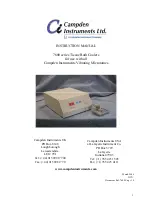
5
www.mastercool.com
LIQUID
VAPOR
RESET
OFF
30
25
20
15
10
5
0
0
200
250
30
0
350
40
0
450
150
100
100
90
80
70
60
50
40
30
20
10
11
0
130
120
140
150
350
50
0
PSI
PSI
BAR
BAR
R134
a
MC
R134a
MC
40
60
50
70
80
30
20
10
0
19
0
18
0
17
0
160
150
140
130
120
11
0
10
0
90
80
70
60
40
20
0
34
1
2
3
4
5
6
7
8
9
10
18
0
0
10
-1
0
-20
-30
20
30
40
10
20
-20
30
40
50
60
70
80
90
10
0
110
-40 F
In Hg
VAC
10
20
30
R
AIR CONDITIONING
or
REFRIGERATION SYSTEM
RECOVERY
SYSTEM
DO NOT fill tank more than 80% of capacity!
APPROVED
RECOVERY
TANK
VAPOR
VALVE
Manifold
W/Sight Glass
FIGURE 1
8. Turn on Recovery System (push
power switch “I”).
9. Observe operation of system. In
rare instances “slugging “ may
be apparent (loud compressor
noise or high vibration). If this
condition is apparent turn inlet
valve to
LIQUID
position.
System can be run with this
setting continuously. It is
suggested that operator
periodically turn inlet valve to
OPEN
position and check for
proper operation of system.
Best operation of the system is
with inlet valve fully
OPEN.
10. Recovery is complete when inlet reading is about 380 - 510mm (about 15 - 20”) of mercury vacuum. Turn inlet valve
to close position and turn power switch off. Recovery is complete.
RECOVERY SYSTEM PURGE
1. Turn off power switch. Turn inlet valve to
PURGE
position. Turn center valve to
PURGE
position. Make sure outlet valve
is in
OPEN
position. Start System.
2. Purge may take a few minutes as some liquid refrigerant may be in the Recovery System. The liquid must become
vapor, which may require some time.
3. Shut
OFF
Recovery System power switch. If system is to be used with the same refrigerant next operation, shut outlet
valve and disconnect outlet hose. If opening of Recovery System is required, disconnect outlet hose to relieve residual
pressure.
4. The inlet port has a fine screen filter. Remove inlet nut and clean or replace filter after every use. A clean filter is very
important for the proper operation of the System.
PUSH – PULL LIQUID RECOVERY METHOD
(Refer to fig. 2)
30
25
20
15
10
5
0
0
200
250
300
350
400
450
150
100
100
90
80
70
60
50
40
30
20
10
110
130
120
140
150
350
50
0
PSI
PSI
BAR
BAR
R134a
MC
R134a
MC
40
60
50
70
80
30
20
10
0
190
18
0
17
0
160
150
140
130
120
110
10
0
90
80
70
60
40
20
0
34
1
2
3
4
5
6
7
8
9
10
18
0
0
10
-10
-20
-30
20
30
40
10
20
-20
30
40
50
60
70
80
90
100
11
0
-40
F
RETA
RD
In Hg
VAC
10
20
30
Liquid
Vapor
RESET
OFF
R
Air Conditioning
or
Refrigeration System
Recovery
System
DO NOT fill tank more
than 80% of capacity!
Approved
Recovery
Tank
Use Sight Glass or Manifold W/Sight Glass
FIGURE 2
The push –pull liquid recovery
technique permits recovery of
large volumes of liquid refrigerant
from HVAC or refrigeration
systems. The Recovery System
pulls vapor from the recovery
cylinder and produces high
pressure vapor that is discharged
into vapor service port of system
being evacuated. The liquid
service port is connected to liquid
inlet on recovery tank.
Note: Recovery tank must be used
with a scale that shuts off refriger-
ant flow when tank reaches 80%
of its capacity.
When the Recovery System is started vapor from the recovery tank is compressed and sent, at high pressure, to HVAC or
refrigeration system. As pressure builds, the liquid is “pushed” out of unit into recovery tank. Vapor from recovery tank is
“pulled” out of recovery tank, compressed, and then pressurizes unit.
NOTE:
Some systems may not have liquid service port. This prevents the push-pull technique from being used.
Procedure for Push-Pull technique (Connect system per fig. 2 and following instructions).
1. Connect outlet port of Recovery System to vapor port of unit to be serviced. Use hoses with automatic or manual valves
on both ends to prevent refrigerant release when disconnecting.
2. Connect liquid port on unit to be serviced to liquid port on recovery tank. Recovery tank should be on a scale that
stops flow when 80% tank capacity is reached. This connection should be made with a manifold gauge set with sight
glass to verify liquid flow. Recovery tank must have a minimum pressure rating of 38 bar (550 psi).
3. Connect vapor port of recovery tank to inlet port of Recovery System. Use hose with automatic or manual valve on both
ends.
4. Open valves on unit to be evacuated. Open valves on recovery tank.
5. On Recovery System, rotate outlet valve to
“OPEN”
position. Rotate center valve to
“RECOVER”
position. Rotate inlet






































